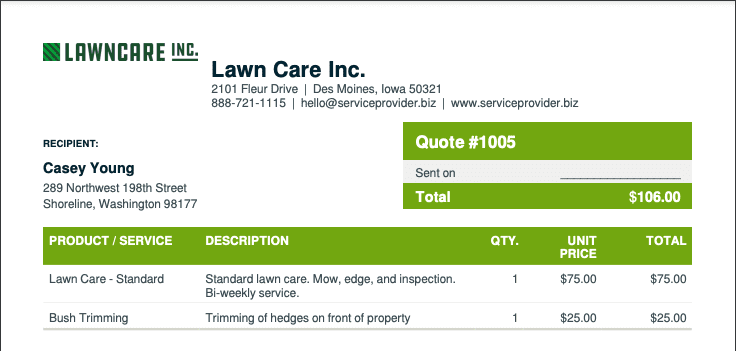It’s well known that you should save for a rainy day, but can your landscaping company work on rainy days?
The answer is yes, landscapers work in the rain—you just need to be safe about it.
By planning ahead, being flexible on your schedule, and maximizing your time, you can keep working despite Mother Nature.
This guide will show you how to work safely, create great policies, and use scheduling tools to keep your landscaping business blooming in rainy conditions.
How you can manage rainy conditions as a landscaper:
When can landscapers work in the rain?
A bit of light rain might not be worth rescheduling a job. Generally, it’s safe to landscape in the rain if you’re not cutting grass, digging holes, or working with power tools.
Here are landscaping and lawn care services that are usually safe to perform in the rain (as long as you’re using manual tools):
- Tree pruning
- Hedge and shrub pruning
- Bush trimming
- Mulch and compost installation
- Sodding
- Weeding
Whether you decide to work in the rain should also depend on your climate. If it rains often in the spring or all year, canceling landscaping work whenever it rains could cost you lots of revenue. But if rain is rare, it might be safer to reschedule.
When shouldn’t you work in the rain?
Avoid doing any landscape maintenance or work if heavy rainfall floods your client’s property or during thunderstorms or high winds. Excess water and mud can create slippery conditions for your workers and make the property a mess.
Avoid these services during heavy rain
Mowing. Workers can slip and fall on wet ground while operating lawn mowers and edge trimmers and might come into contact with blades. It can also be inconvenient and messy, as mowers get clogged with wet clippings and spit out clumps of wet grass.
Dethatching and aeration. You can accidentally tear grass at the roots instead of pulling out just the thatch. Too much water creates muddy soil, which can undo your dethatching and aerating work.
Anything else that requires electrical equipment. If you choose to do lawn maintenance in the rain, only use gas-powered mowers and machines since it’s dangerous to get electrical equipment wet.
READ MORE: 13 Fall & Winter Landscaping Services to Keep a Steady Income All Year
4 ways to manage unpredictable weather conditions
Just because it’s raining doesn’t mean your business stops. Follow these four guidelines to keep your landscaping business running regardless of the weather.
1. Create a rainy day policy
A rainy day policy tells your clients you won’t complete certain work in wet conditions well in advance—so they’re not surprised when the rainy day comes.
Your rainy day policy should let clients know:
- Why it’s safer to reschedule appointments for dry days
- You’ll be the one to decide whether it’s safe enough to do certain jobs in the rain
- Your steps for rescheduling rainy day appointments
- What will happen if the rainy weather continues
To communicate your policies, you can add a rainy day note to the bottom of your lawn care contracts, quotes, and appointment confirmations.
Grab this rainy day note example and make it your own:
Rainy day policy note example
We want to keep your lawn tidy, our employees safe, and our equipment in good condition. To ensure this happens, we reserve the right to adjust service times or delay appointments in the event of rain.
We’ll do our best to serve you as soon as possible, and you’ll only be billed for our time once that service has been provided. Thank you for your understanding and your business!
You can also email this policy to all your clients right before the rainy season starts. This message will prepare them for frequent rescheduling due to rainy weather.
Your rainy day policy email could look like this:
Rainy day policy email example
Hi [CLIENT NAME],
Looking ahead at the forecast, we’re entering our rainy season.
We will continue to try our best to work on your property on our regularly scheduled day. However, there may be times in the upcoming weeks that your service day is delayed or moved slightly due to weather conditions. When this happens, we will work hard to make sure your property stays maintained and that you get back on your regular schedule.
Our goal is to keep your lawns and landscapes beautiful and your satisfaction high, so we will never mow or landscape if your property is too wet.
As always, we appreciate your business!
Sincerely,
[YOUR COMPANY NAME]
2. Build flexibility into your scheduling
To avoid scheduling headaches and reduce overtime work, create room in your schedule so you can easily reschedule rainy day work you had to cancel. Here are a few scheduling methods you can use for your team:
Leave one day of the week for make-up work
Many landscaping businesses work four days per week, and leave a fifth day for extra work or rescheduled jobs.
For example, you might schedule all your jobs for Monday to Thursday, and none on Friday. This gives you Fridays to do any work that had to be rescheduled due to rain.
Offer your clients a multiple-day service window
Instead of booking a landscaping visit for a specific day, book it for a two- or three-day service window. If it rains on one of those days, you can complete the work another day if it’s within that service window.
You’ll still need to share your rainy day policy with your clients if it rains on all those service days.
READ MORE: How to build a profitable lawn mowing schedule [free template]
Alternate landscaping and lawn care jobs
If you provide both landscaping and lawn care services, an alternating schedule can make it easier to rearrange visits due to the weather and prioritize landscaping when it rains.
Landscaping visits should come first in the schedule since it’s safer and easier to do landscaping work in the rain than lawn maintenance. This way, you’ll only have to push back your lawn care appointments if it rains.
Here’s a scenario using the alternating scheduling system:
- On Monday and Wednesday, you scheduled a landscaping project for Amy.
- On Tuesday, you’re mowing for Bob.
- It’s going to rain on Monday and Tuesday.

If you push back your Monday and Tuesday visits, you’ll have to push back all your jobs for the week, too—and that affects all your future work days. Here’s what you can do instead:
- Move Amy’s second landscaping appointment from Wednesday to Tuesday.
- Reschedule your Tuesday mowing job to Wednesday (when it’s sunny).
- Now, you only have to landscape in the rain.

Clients will be happier to get their projects done sooner instead of having them delayed. Plus, this schedule helps you avoid overtime and weekend work.
If you leave one day of the week for make-up work (in this example, Friday), you’ll have an extra day for delayed appointments if it continues to rain.
READ MORE: The 8 best scheduling apps for small business owners
Use an easily customizable scheduling tool
Instead of updating spreadsheets and paper when you have to reschedule multiple visits at once, you can use bulk scheduling with a tool like Jobber to do it in minutes.
When you reschedule a visit using Jobber’s scheduling software, the employee assigned to that job will get a notification on their phone with all the details.
READ MORE: How to Run a Successful Lawn Care Business: 8 Management Tips
3. Send schedule updates to your clients
As soon as you know it’s too rainy to work, send an email or text message to tell your clients you need to reschedule. If bad weather is expected to last for the whole week or longer, call your customers to reschedule for a later date.
- Email all your clients at once. When you need to cancel all your jobs on a rainy day, you can send a single email to all the clients you had booked for that day. Let them know that you’ll text them individually with their new appointment date and time—or that they’ll get an automated email notification.
- Call each client. Talking on the phone with clients individually can soften the blow of having to reschedule an appointment. Gently let them know that it’s safest to wait until the rain stops, and try to work out a new visit date over the phone.
- Announce schedule changes on social media. Encourage your clients to follow you on social media for service updates. There, you can post a single rainy day message where your clients can all see it at once. Tell upcoming clients that their scheduled work might be affected, too—even if they aren’t booked for the rainy day.
Or, use Jobber to send automated notifications to your clients when you update their appointment details.

Example of client notifications in Jobber.
4. Work on other parts of your business
When you can’t work outdoors, spend rainy days catching up on work you normally don’t have time for.
Quotes, invoicing, and other paperwork
Spend time on paperwork that brings in business, like sending out quotes, bidding on new jobs, and following up on invoices.

Example of a lawn care quote made in Jobber
Cleaning up and organizing
Tidy the shop or run any leftover job debris over to the dump. This is a good way to keep your crews busy and paid—and still help your business.
Inventory
Take stock of what you have in the shop and what needs replenishing. Then, pick up more soil, fertilizer, gloves, spare parts, and any other tools or supplies you need for landscaping and lawn care jobs.
Equipment maintenance
Create an equipment maintenance checklist to help you and your team inspect your mowers, tractors, core aerators, and power tools. Be sure to check oil levels, air filters, and tire pressure on all your machines.
Employee training and development
Train your team on work safety, new landscaping techniques, or other skills you wouldn’t normally have time to teach. You can also use this time to brainstorm ways to solve common obstacles you face in the field.
Dave Moerman, a guest on the Masters of Home Service Podcast, recommends that owners use downtime wisely to strengthen their businesses.
One way to do this is to involve key employees in improving systems and training. Whether it’s creating checklists, procedures, or training resources.
You got to get creative. If you have someone super switched on and loyal to your business, I would really lay awake at night figuring out how to keep them busy.
Marketing
Update your landscaping website and social media profiles with new project photos, testimonials, and promotions. You can also explore new marketing ideas for your business, such as email campaigns, landscaping flyers, and door hanger advertising.

Example of customer marketing email templates in Jobber
Client check-ins
When you can’t work on a client’s property, you can still strengthen your relationship with them. Send thank-you notes to your clients and ask for their honest feedback. You can also use this time to ask for online reviews so you can look better to potential clients.
LISTEN: How to Navigate the Off-Season with Confidence, on the Masters of Home Service Podcast
Always be prepared for rainy days
You’ll always have to deal with rainy days in the landscaping business. But don’t worry—if you build a plan to keep your business running, your employees busy, and your clients happy, there will always be sunny days ahead.
Originally published in May 2022. Last updated on April 4, 2024.
